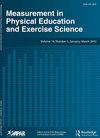The Activities-specific Balance Confidence (ABC) Scale in Youth with Visual Impairments: Psychometrics and a Population-specific Short Form
IF 1.9
4区 教育学
Q2 EDUCATION & EDUCATIONAL RESEARCH
Measurement in Physical Education and Exercise Science
Pub Date : 2021-07-05
DOI:10.1080/1091367X.2021.1949321
引用次数: 536
Abstract
ABSTRACT Falls are a significant medical and economical concern worldwide. Younger individuals with visual impairment (VI) may be more susceptible to falling and fall-related injuries when compared to peers without a VI. Self-perceived balance confidence is a psychological construct that may predict and/or mediate fall- or other health-related outcomes in youth with VI. However, extensive psychometric vetting of falls-related self-efficacy self-report inventories (such as the Activity-specific Balance Confidence Scale [ABC]) have not occurred in youth with VI. In line with classical test theory, the purposes of this study were to examine the immediate measurement properties of ABC scores in youth with VI and to derive and analyze a short version of the ABC in youth with VI (N=101). Total and item-level ABC (and the newly developed ABC-6VI) scores presented with strong-to-acceptable forms/levels of reliability and validity. ABC-6VI scores appear to have certain psychometric limitations (i.e., increased variability; decreased stability).视觉障碍青年活动特异性平衡自信量表:心理测量学和人群特异性简表
摘要瀑布是世界范围内一个重要的医疗和经济问题。与没有视力障碍的同龄人相比,患有视力障碍(VI)的年轻人可能更容易受到跌倒和跌倒相关的伤害。自我感知平衡信心是一种心理结构,可以预测和/或介导患有视力障碍的年轻人的跌倒或其他健康相关结果。然而,在患有VI的年轻人中,没有对跌倒相关的自我效能自我报告量表(如活动特异性平衡自信量表[ABC])进行广泛的心理测量学检查。根据经典测试理论,本研究的目的是检验VI青年ABC评分的即时测量特性,并推导和分析VI青年ABC的简短版本(N=101)。总分和项目级ABC(以及新开发的ABC-6VI)得分具有很强的可接受的信度和有效性形式/水平。ABC-6VI评分似乎有一定的心理测量局限性(即变异性增加;稳定性降低)。
本文章由计算机程序翻译,如有差异,请以英文原文为准。
求助全文
约1分钟内获得全文
求助全文
来源期刊

Measurement in Physical Education and Exercise Science
Medicine-Orthopedics and Sports Medicine
CiteScore
4.20
自引率
33.30%
发文量
24
期刊介绍:
The scope of Measurement in Physical Education and Exercise Science (MPEES) covers original measurement research, special issues, and tutorials within six substantive disciplines of physical education and exercise science. Six of the seven sections of MPEES define the substantive disciplines within the purview of the original research to be published in the journal: Exercise Science, Physical Activity, Physical Education Pedagogy, Psychology, Research Methodology and Statistics, and Sport Management and Administration. The seventh section of MPEES, Tutorial and Teacher’s Toolbox, serves to provide an outlet for review and/or didactic manuscripts to be published in the journal. Special issues provide an avenue for a coherent set of manuscripts (e.g., four to five) to collectively focus in-depth on an important and timely measurement-related issue within the scope of MPEES. The primary aim of MPEES is to publish high-impact manuscripts, most of which will focus on original research, that fit within the scope of the journal.
 求助内容:
求助内容: 应助结果提醒方式:
应助结果提醒方式:


